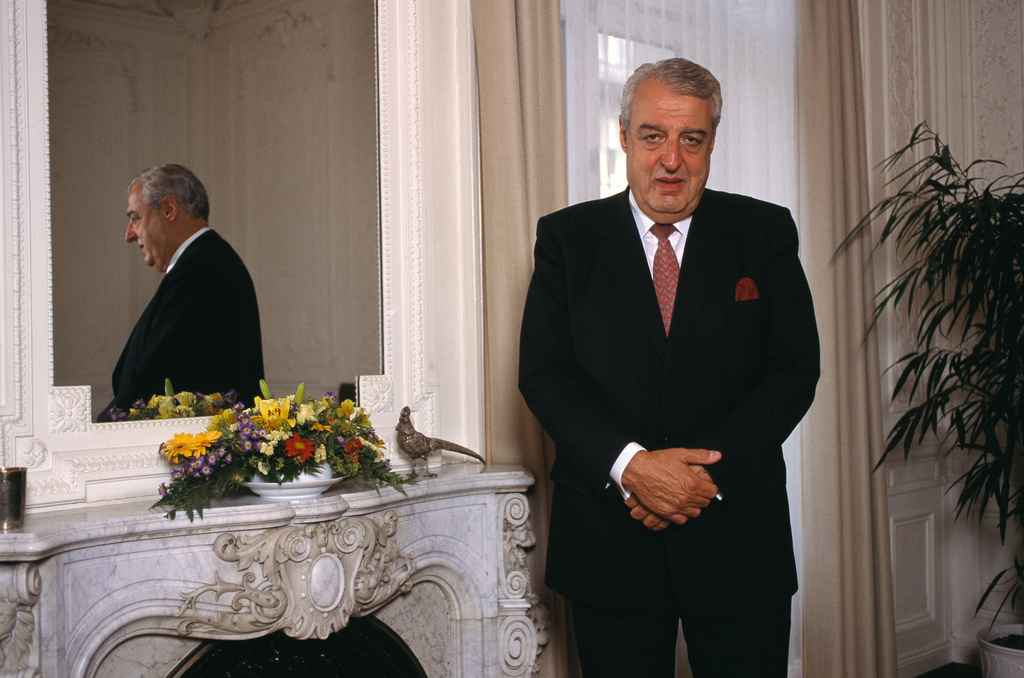
Arts-loving banker Bär bridged divides

One of Switzerland’s most prominent bankers, Hans J. Bär, will be best remembered as a healer of divisions after brokering a deal to pay back Holocaust era assets.
The former chairman of Julius Bär bank, who died aged 83 on Monday after a long illness, was a key member of the Volcker Commission that engineered the restitution of dormant accounts to their rightful Jewish owners.
Hans J Bär has been described as one of the old school of private bankers who mixed finance with patronage of the arts scene in his home city of Zurich.
After playing a key role in the restructuring and expansion of one of Switzerland’s biggest private banks, Bär was called upon to help resolve a dispute between the Swiss banking community and Jewish associations.
Bär has been credited as lead negotiator between Swiss banks and the World Jewish Congress that settled a law suit with $1.25 billion (SFr1.13 billion) being made available to Holocaust era victims and their heirs.
As a Swiss banker, a Jew and with his experience of having lived in the United States – from where the main complaints had originated – Bär was in many ways the perfect negotiator. But another major strength was his impartiality, according to Nicole Poëll, President of the Platform of Liberal Jews in Switzerland.
“He was of Jewish faith, but maintained a certain distance from the Jewish community, so he was able to talk about the problems as a banker and as a Jew,” she told swissinfo.ch. “He was a very independent thinker.”
“Grand old man”
Bär’s sojourn in the US began in 1941 when he emigrated with his family following the death of his father.
In his teenage years it seemed unlikely that Bär would eventually head into finance. His father had been a physicist, his mother was a sculptor and art played a far greater influence in his early life than numbers and currencies.
But after completing an industrial engineering degree at Lehigh University in Pennsylvania, he joined the family owned Julius Bär bank in 1947.
Rising to partner in 1960, then president of the executive board between 1975 and 1993, he oversaw the restructuring of the bank, its listing on the Zurich stock exchange and its expansion into New York, London and then other parts of the world.
“He was one of the grand old men of Swiss banking and had a very elegant style,” Hans Geiger, emeritus professor at Zurich University’s banking and finance institute, told swissinfo.ch.
“He would not have fitted in very well with the new era of bankers that have brought the bonus culture and profit-obsessed objectives over from Wall Street. He was no car salesman.”
Independent streak
Bär’s independent streak showed itself again in his 2004 autobiography, entitled: “It’s Not All About Money”.
In this book, he criticised fat-cat bonuses and even Swiss banking secrecy, quoting Winston Churchill who said it made Swiss bankers “fat and impotent”.
“This really enraged the Swiss banking community who asked why he was criticising banking secrecy after making a living from it,” Geiger said. “But on reflection, it appears that he saw the writing on the wall [a reference to the global attack on secrecy in the past two years].”
Bär also never lost his love of the arts, sponsoring the Zurich Tonhalle Orchestra for ten years from 1982 and was a founding member of the Zurich Festspiele, an annual cultural event.
1890 Establishment of Hirschhorn & Grob partnership.
1896 Julius Bär becomes member of Hirschhorn & Grob. Bank changes name to Hirschhorn, Uhl & Baer.
1901 Julius Bär & Co established after death of Ludwig Hirschhorn.
1924 Bank purchases former premises of Swiss National Bank on Bahnhofstrasse in Zurich, which become its headquarters.
1940 First Julius Bär company established abroad with founding of Baer Custodian Corporation on Wall Street, New York.
1947 Hans J Bär joins the bank, becoming a partner in 1960, president of the executive board from 1975 until 1993 and then chairman until his retirement in 1996.
1974 Establishes business in the Cayman Islands.
1980 Bär Holding Ltd goes public with share issue.
1990-2011 Continues expansion through acquisitions and establishing banks in Russia, the Middle East and Asia.
The Volcker Commission was established on May 2, 1996, by a memorandum of understanding between the World Jewish Organisation, World Jewish Congress and Swiss Bankers Association.
It had two objectives: to identify accounts in Swiss banks of victims of Nazi persecution that had lain dormant since the Second World War or had otherwise not been made available to those victims or their heirs; and to assess the treatment of the accounts of victims of Nazi persecution by Swiss banks.
The commission released its findings in 1999 and found 54,000 accounts that may have belonged to Holocaust victims. 5,559 names of account holders living outside Switzerland with a value of $44.2 million were published in 1997.
In 1998, a US class-action law suit was settled for $1.25 billion by Switzerland’s two largest banks, UBS and Credit Suisse, and was meant to cover claims by victims and their heirs.

In compliance with the JTI standards
More: SWI swissinfo.ch certified by the Journalism Trust Initiative


























You can find an overview of ongoing debates with our journalists here . Please join us!
If you want to start a conversation about a topic raised in this article or want to report factual errors, email us at english@swissinfo.ch.